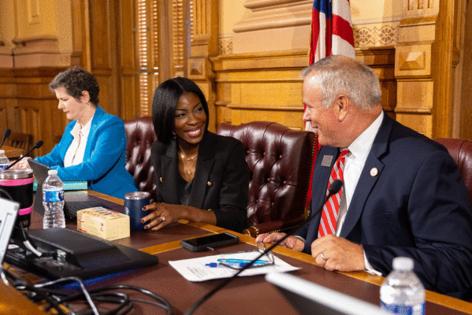Georgia Election Board's private Gmail questioned in transparency lawsuit
Published in Political News
ATLANTA — Two Republican State Election Board members who use private Gmail accounts for official business have refused to allow searches of their emails, leading to an accusation that they’re violating government transparency laws.
A lawsuit by the watchdog group American Oversight alleges the State Election Board has “systematically obstructed public records requests” for information about voter eligibility challenges, communications with outside organizations and voter citizenship verification.
The two election board members, Janice Johnston and Janelle King, said they follow Georgia’s open records laws and provide emails upon request. But they said they’re unwilling to share their email accounts with government records officers.
Without any outside review, there’s no way to ensure that all requested emails are disclosed, said Loree Stark, an attorney for American Oversight.
Under Georgia’s Open Records Act, most government documents must be made available, including communications from personal accounts if they’re used to conduct public business.
“This is about transparency and the public’s right to know,” Stark said. “It’s hard to know when someone is doing their own search on their own emails whether they’re ever truly turning over responsive documents.”
The State Election Board faced intense scrutiny leading up to last year’s election, pushing through new rules for hand-counting of ballots on election night and an “inquiry” by county election boards before certifying results. The courts threw out the rules, finding the board had exceeded its authority. Appeals are pending.
Johnston, who was appointed by the Georgia Republican Party, said the board uses Gmail because the secretary of state’s office hasn’t provided government email addresses, and she’s uncomfortable with sharing her email password.
“How could I be sure that my emails were secure — not deleted, not edited or not leaked to bad actors?” Johnston said. “I have been very diligent in my ORR (open record request) searches.”
King, who was appointed by Republican House Speaker Jon Burns, said she uses personal email addresses both for the State Election Board and for her role on the Georgia Board of Corrections.
“I do not have any agenda other than to do the right thing. ... I can’t pick and choose what to send. I have to send whatever is asked in the ORR — emails, text, etc.,” King said. “I prefer to manage my stuff. Nothing more and nothing less.”
The three other members of the board also use Gmail accounts, but they permit the board’s paralegal to conduct records searches.
“The public officials may in fact be hiding nothing, but the fact is we will never know. That lends credence to all these conspiracy theories,” said Richard Griffiths of the Georgia First Amendment Foundation. “By moving their communications onto services that aren’t available to the public for inspection, it raises all kinds of questions about what those officials may be trying to hide.”
In response to records requests by The Atlanta Journal-Constitution last year, the board revealed hundreds of pages of emails. In some cases, it took several months to obtain the documents.
The emails include conversations with Republican county election board members about revising election certification requirements, allegations of inaccurate voter registrations and complaints about Fulton County’s handling of the 2020 election.
Additional emails obtained by the AJC last summer indicated that two election rules had been proposed by the Georgia Republican Party.
Johnston also provided emails last week showing she requested a government email address in 2022, but it hasn’t been provided by the secretary of state’s office.
Gov. Brian Kemp vetoed $25,000 from the state budget this year for a State Election Board website, which could have funded email services as well.
“The culture of mistrust that has been created has caused board members not to want to give anyone unfettered access,” said Mike Coan, the board’s executive director.
Johnston has asked a judge to dismiss American Oversight’s lawsuit. Violations of the Georgia Open Records Act come with penalties up to $1,000 per violation and $2,500 for repeat offenses.
In a previous open records lawsuit by American Oversight, the group alleged that Secretary of State Brad Raffensperger’s office failed to provide election documents in response to 61 records requests over 19 months. The secretary of state’s office released thousands of pages of documents shortly before a court hearing in 2020 and later settled the case.
©2025 The Atlanta Journal-Constitution. Visit at ajc.com. Distributed by Tribune Content Agency, LLC.




























































Comments